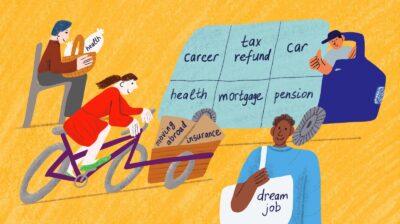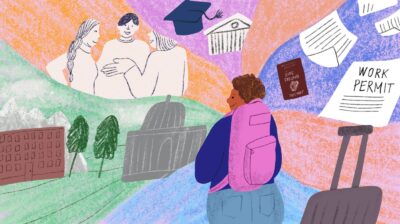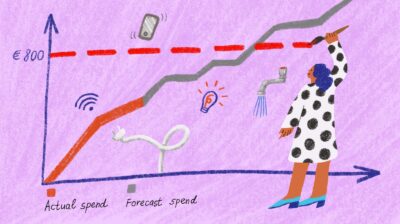My experience transitioning from youth to adult mental health services
While Rebecca was initially worried about moving to adult mental health services, she soon found her place.

Editors note: Please note that this piece includes the mention of an eating disorder. Mind yourself if you choose to read further.
Turning 18 is a milestone that almost all teenagers can hardly wait to reach. If you ask a 17 year old their age, they are likely to respond with the likes of ‘I’m 17, but I’ll be 18 in a couple of months.’ With all the excitement of what you can finally do when you’re 18, the reality of what being an adult truly means is blurred until you realise that you can’t pick and choose. For example, when I turned 18, I would argue that I’m an adult so I could stay out as long as I liked, yet I still expected my Mam to ring the doctor for me when I’m sick. In other words, I was an adult when I wanted to be.
The harsh reality was that if I wanted to be treated as an adult in a particular situation, I would have to act like one in every situation. Turning 18 comes with a lot of changes, some more difficult than others. A challenging one for some is the transition from youth to adult mental health services. In my case, it wasn’t just that I needed my Mam to ring the doctor for me, I also needed her to come with me and do the talking. This was the same with any mental health professional. Any question directed to me was responded to with a nod in her direction.
A leap from youth to adult services
My transition from youth to adult services was quite a jump. In fact, it happened so suddenly I didn’t even get the chance to process it at the time. You see, my transition began with an inpatient admission to a psychiatric hospital.
Since I had only very recently left 17 behind me and hadn’t even finished secondary school, I felt as though I belonged in the adolescent ward. However, the reality of it was that I was 18 and whether I felt like one or not, I was officially considered an adult. Because of this, the adult ward, of course, is where I belonged.
This experience was so overwhelming that the same day I was admitted, I went home. I had unpacked my bag, met my roommate, spoken to the psychiatrist, and even ate my dinner, only to say no thank you and decide not to stay. So I repacked my bag and I left.
Thankfully that wasn’t the end of the story because despite the hospital being the last place on earth that I wanted to be, I knew it was where I needed to be. So I spent the weekend at home, and I built the courage to return. As someone who does not cope well with change, going in and coming back home gave me the chance to prepare myself which actually made being admitted (for real this time) a bit easier. Nevertheless, the problem still remained that I felt as vulnerable as a child and surrounded only by adults.
Settling into a new community
In a surprising turn of events, it wasn’t long before I began to find my place and feel like an equal. I met people that were twice and three times my age with whom I related to more than I ever had with anyone my own age. I soon recognised that this was a transformation, not just a transition and that there were benefits to being treated like an adult including respect and independence. I also came to learn that adults could be just as vulnerable as anyone else.
Along with respect and independence, a huge benefit of transitioning to adult services is confidentiality. I feel as though a lot of young people tend to hold back when talking about their emotions because they fear that the information they share will go right back to their parents/guardian It’s much easier to open up when you know that what you say will be kept in the room, which as an adult, it generally does.
In conclusion, even though at the time I wished that my Mam could have come to the hospital with me and spoken on my behalf at every session, being thrown into the deep end forced me to identify and understand my own emotions. I discovered that, when I actually tried to, I was very good at articulating what I was going through. I also gained important skills such as assertiveness and self-awareness.
How these skills have helped me
By being self-aware, I am able to recognise how I am feeling and why I am feeling that way. With this knowledge, I am more easily able to manage my emotions. Assertiveness is a skill that made a big impact on where I am today. When I was younger, I would go to an appointment, smile, nod, and then leave, regretting everything I should have said but didn’t. One day this changed, when I decided to talk about something I had been keeping to myself because I was afraid of not being taken seriously.
While I was in hospital, I was being treated for Borderline Personality Disorder, however, what nobody knew was that I was struggling just as much with an eating disorder. It took a great amount of bravery that I didn’t even know I had to speak up about it. Unfortunately, that bravery was met with the response that all I needed was a “healthy diet and exercise.” I left the appointment feeling worse than I did before.
At that moment, I wished I never brought it up but instead of letting it consume me, I did something I had never done before. I went back to the doctor, and I told him that he was wrong. I told him that this was more than just a casual concern about my weight and that it was beginning to take over my life. This time he listened to what I had to say and took action that never would have been taken if I hadn’t spoken up for myself. Because of this, my eating disorder was now acknowledged and I got the right treatment that I needed.
Looking back, I think my doctor actually felt quite proud of me that day.
Feeling overwhelmed and want to talk to someone?
- Get anonymous support 24/7 with our text message support service
- Connect with a trained volunteer who will listen to you, and help you to move forward feeling better
- Whatsapp us now or free-text SPUNOUT to 50808 to begin.
- Find out more about our text message support service
If you are a customer of the 48 or An Post network or cannot get through using the ‘50808’ short code please text HELLO to 086 1800 280 (standard message rates may apply). Some smaller networks do not support short codes like ‘50808’.






